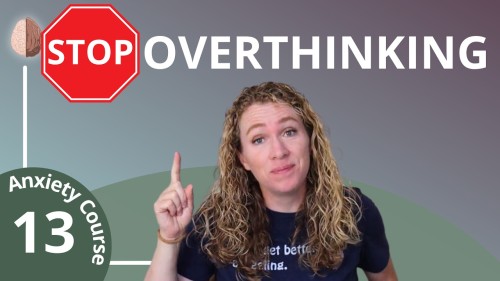
Stop Overthinking & Anxiety: Effective CBT & Act Techniques
Published 11/2024
MP4 | Video: h264, 1920x1080 | Audio: AAC, 44.1 KHz
Language: English | Size: 502.25 MB | Duration: 1h 23m
The most Powerful Tools I've learnt as a Clinical Psychology Student - CBT and ACT techniques for Anxiety & Overthinking
What you'll learn
What is overthinking?
Anxiety Management
The neuroscience behind why we overthink.
Strategies based on science that can be used to stop overthinking.
Strategies to stop thinking negative thoughts about ourselves
You will learn about useful psychological theories such as: CBT (Cognitive Behavioral Therapy),Acceptance and Commitment Therapy, and Compassion-Focused Therapy
Requirements
No prior psychology knowledge acquired. This lecture will guide you through all the necessary steps to stop overthinking and anxiety management. It will give you both theoretical and practical knowledge
Description
We've all been there. Thoughts cycles around in our heads, and the anxiety in our bodies rises. Despite all attempts at distraction or trying to stop the negative thoughts, overthinking seems to come back—often in an even stronger form. Overthinking and Anxiety is one of the most common problems people face, and it can steal time and energy from other activities that would bring us more happiness. In this lesson, you will learn several techniques to help stop overthinking and manage Anxiety. To develop this lesson, I've drawn from some of the most well-researched psychological theories, such as Cognitive Behavioral Therapy (CBT), Acceptance and Commitment Therapy (ACT), and Self-compassion Therapy.What is overthinking?Overthinking can be described as a chain of thoughts that constantly circulate in our minds, where the brain tries to influence, predict, change, or prepare for something that is either upcoming or has already happened. It's like a broken record, playing over and over again.The problem with overthinking is that we can't escape our thoughts. Sooner or later, we must confront the negative thoughts that cause our anxiety. The fact that you've clicked on this course is the first step toward stopping overthinking and manage anxiety—so I will do my best to teach you the best strategies to break negative thought patterns and, as a result, live a happier life!In this course, you will learn:What overthinking is and why your brain so easily gets caught up in it. You'll get a comprehensive understanding of why we overthink and the neuroscience behind it.How overthinking works. Getting stuck in overthinking is no coincidence; it is driven by our thought patterns. By becoming aware of different types of thoughts and what fuels overthinking, we can also break the endless loop!You will also learn four practical strategies, with several exercises, that you can use to stop overthinking and manage anxiety:Stop comforting thoughts – A technique based on our understanding of how overthinking works, designed to break the natural tendency to overthink. Cognitive Restructuring – This technique, rooted in Cognitive Behavioral Therapy, has been used for many years by psychologists to restructure our thought content. By learning about common cognitive traps and how we can question the accuracy of our thoughts, we can gain new perspectives that can help break the cycle of overthinking.Cognitive Defusion – One of the most widely-used techniques for reducing the impact of negative thoughts on us and our anxiety. Personally, this is one of the most important lessons I've learned as a psychology student. This technique originates from Acceptance and Commitment Therapy, a relatively new theory with strong research support!Self-Compassion – Do you often have negative thoughts about yourself? Do you feel like you would benefit from being a little kinder to yourself and, in turn, becoming your own biggest supporter? If so, Self-Compassion is for you! With this technique, we will practice Self-kindness and treating ourselves with the same kindness we often show to those we love.By choosing one of these techniques and practicing it, I've found that many people can reduce overthinking and live a happier life with less anxiety, worry, and sadness. If this sounds interesting to you, I warmly welcome you to join me in this course and learn everything you need to know to stop overthinking!
Overview
Section 1: Complete Guide to Stop Overthinking
Lecture 1 About Me
Lecture 2 Practical Tips for Students
Section 2: What Is Overthinking?
Lecture 3 What Is Overthinking?
Lecture 4 The Neuroscience Behind Why We Overthink
Lecture 5 Why Do Our Brains Overthink?
Section 3: How Overthinking Works
Lecture 6 Two Different Types of Thoughts
Lecture 7 Common Thoughts to Overthink About
Lecture 8 First Strategy - Stop Comforting Thoughts
Lecture 9 How Overthinking Works
Lecture 10 How Overthinking Works part 2
Section 4: Why Do We Need to Stop with the Comforting Thoughts?
Lecture 11 Why Do We Need to Stop with the Comforting Thoughts? - Positive Reinforcement
Lecture 12 Why Doesn't My Overthinking Go Away?
Section 5: Stop Comforting Thoughts - Strategy one
Lecture 13 Stop Comforting Thoughts - Acceptance
Lecture 14 Fully Embrace the Worst Thought
Section 6: Four Strategies you will Learn in this Course
Lecture 15 Four Strategies
Section 7: Cognitive Restructuring
Lecture 16 About Cognitive Restructuring
Lecture 17 Identify Your Negative Thoughts
Lecture 18 Cognitive Distortions
Lecture 19 Challenge Cognitive Distortions/Negative Thoughts - Socratic Questioning
Section 8: Cognitive Defusion
Lecture 20 About Cognitive Defusion
Lecture 21 Not Believing Your Thoughts
Lecture 22 Using Metaphores
Lecture 23 Cognitive Distancing
Section 9: Self-Compassion
Lecture 24 About Self-Compassion
Lecture 25 Talking to a Friend
Lecture 26 Writing a Compassion-Letter
Section 10: Thank You for Taking This Lecture!
Lecture 27 Thank You for Taking This Lecture!
The lecture is aimed at those who easily get caught up in overthinking and negative self-talk. Overthinking is a common issue - one that can be addressed with the right strategies.,The lecture is also for those who want to learn more about one of the most common causes of psychological distress. Perhaps you work with individuals, or have a friend who overthinks. With this lecture, you'll become an expert in stopping overthinking!
https://rapidgator.net/file/c939c3851aed65aa187ba61ccc79562b/Stop_Overthinking_Anxiety_Effective_CBT_ACT_Techniques.rar.html
https://ddownload.com/mori4pn44oth/Stop_Overthinking_Anxiety_Effective_CBT_ACT_Techniques.rar










